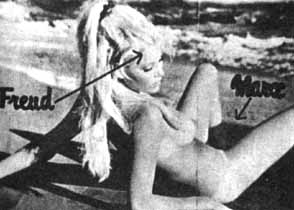Anti-Climax

maruxushugishya 
Allegory: sustained metaphor; the antidote to myth; insists on the sheer artificiality of constructs in ways that myths do not.
So it is with the present portion of the work, which aims to characterize and to preserve the intervals of reflection, the distances lying between the most essential parts of this work, which are turned most intensively to the outside. [N1,3]
Is Benjamin trying to create some sort of unity?
Derrida from Limited Inc., "Rather, I deconcentrate, and it is the secondary, eccentric, lateral, marginal, parasitic, borderline cases which are ‘important’ to me and are a source of many things, such as pleasure, but also into the general functioning of a textual system. And were there to be a center to this debate, we would have reached it already, in the form of this difference in styles of reading. But what is involved is more than a difference in style" (45).
While in Aragon there remains an impressionistic element, namely the ‘mythology’ . . . here it is a question of the dissolution of ‘mythology’ into the space of history. That, of course, can happen only through the awakening of a not-yet-conscious knowledge of what has been. [N1, 9]
Commodity: fetish and fossil. Wish image and ruin.
Empathy with the commodity is fundamentally empathy with exchange value itself. [M17a, 3]
Barthes from Mythologies: "The starting point of these reflections was usually a feeling of impatience at the sight of the ‘naturalness’ with which newspapers, art and common sense constantly dress up a reality which, even though it is the one we live in, is undoubtedly determined by history. In short, in the account given of our contemporary circumstances, I resented seeing Nature and History confused at every turn, and I wanted to track down, in the decorative display of what-goes-without-saying, the ideological abuse which, in my view, is hidden there" (11).
Concept of nature in Marx: "If in Hegel . . . ‘physical nature likewise encroaches on world history,’ then Marx conceives nature from the beginning in social categories. Physical nature does not enter directly into world history; rather, it enters indirectly, as a process of material production that goes on, from the earliest moment, not only between man and nature but also between man and man. Or, to use language that will be clear to philosophers as well: in Marx’s rigorously social science, that pure nature presupposed by all huan activity (the economic natura naturans) is replaced everywhere by nature as material production—that is, by a social ‘matter’ mediated and transformed through human social activity, and thus at the same time capable of further change and modification in the present and future," Korsch, Karl Marx, vol. 3, p.3.
[N16, 4]
Butler from Bodies That Matter: "The process of that sedimentation or what we might call materialization will be a kind of citationality, the acquisition being through the citing of power, a citing that establishes an originary complicity with power in the formation of the ‘I’." (15)
Back to Negri: "We can see in it the passion for totality, but only in the form of a series of multiplicities and leaps, never in a monolithic sense; we can find in it, above all, a dynamic which has the plurality and the same diversity of subjectivity, and is nowhere closed" (13).
The lack of narrative structure does not produce capriciousness of meaning.


<< Home